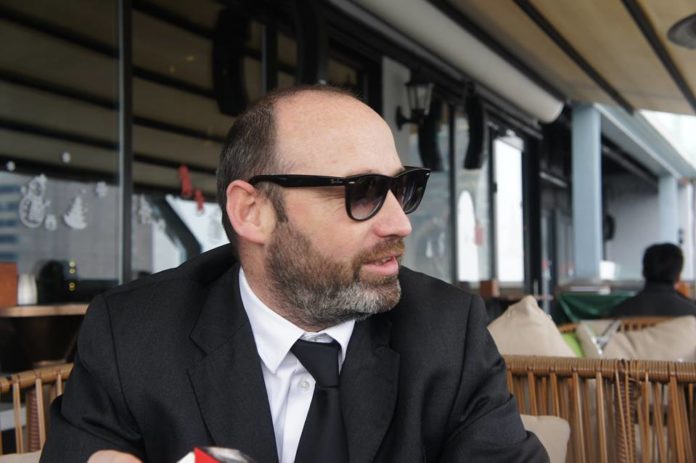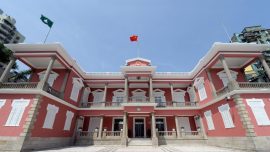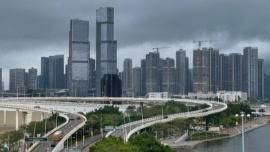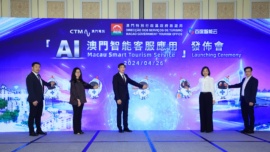Having worked most of his professional life at Thomson Reuters, Marco Duarte Rizollio decided the MSAR was the perfect place to start his first company, a one-stop tourism online platform called Follow Me Macau. Focused on independent millennial visitors to Macau, the company allows users to search and purchase lifestyle experiences in the city. With its launch ceremony scheduled for October 20, Marco shared with Business Daily the challenges of opening a company with an online presence in mainland China, while still being firmly rooted in Macau.
What was your professional background before coming to Macau?
I studied Economics at the Paris-Sorbonne University in Paris, and when I finished my studies moved to Portugal in 1999. When I arrived, I started working in finance and in investment banking, transitioning quickly to the Thomson Reuters commercial department where I had most of my professional career.
Although most people associate Thomson Reuters with a news agency, 98 per cent of its revenues actually comes from software, it’s a company also involved in technology selling software to investment banking and financial markets.
They have trading, analysis and graphic design software, databases and also develop legal matters software for lawyers.
So I wasn’t on the editorial section of Reuters, but on the commercial side, starting in customer support and later dealing with account management.
I was lucky to progress in the company through different international branch offices, passing from Lisbon to Madrid, where I stayed for four years and where I started specialising in the commodities or raw materials market.
After a while, I was invited to the Brazilian branch office in São Paulo and moved there in the beginning of 2010 and stayed for four years. I went there to develop the raw materials market, since Brazil is one of the largest producers of raw materials worldwide, especially agricultural and metal materials.
After that, I had the luck to be promoted to Commercial Director of Reuters, managing the whole company operations in Brazil.
What led you to move to Macau?
When my expat contract finished in Brazil and wasn’t going to be renewed, I had options to go to Canada or Portugal, but my wife was raised here so she wanted to come back to a city where most of her family is located. During all my expat life, she always accompanied me during all the changes, so I decided I would move with her to Macau.
After arriving, I entered a British company named TCS John Huxley, the largest company of table gaming solutions in the world.
They produce all kinds of table games materials, from the table itself to roulette and Sic Bo.
They produce almost 99 per cent of Sic Bo tables, producing screen displays, dice shakers and the whole thing. They’re present in Europe, United States, South Africa and of course Asia with the expansion seen in Macau, the Philippines, Singapore and with the possible future opening of the Japanese market. I stayed in that company for about a year, responsible for the Asia market.
So when did you first start to think of creating your own company?
The idea to create a start-up was that after almost 17 years working in the corporate world, I believed I needed a new challenge. During the period when I was working for TCS, [Chinese President] Xi Jinping visited Macau and there was the whole VIP gaming sector crisis, with the main speech passing to the diversification of the local economy.
One of my best friends in Brazil was responsible for expanding Smartbox [an experience gift company] in Brazil, so when I first came to Macau I already had this idea in my head, which just seemed to develop after the talk about economic diversification became more common.
I started thinking that: either I start something by myself that I enjoy doing or I will always be working for someone else, and if there’s a better time to do it, it is now and not when I’m 50-years-old.
We all know that nine out of 10 start-ups end up failing, and I’m very aware of this risk, but when you analyse Macau you see that it has a lot of potential.
It’s a territory of around 35 square kilometres, but with 30 million visitors passing by every year. It’s the sixth largest city in the world in terms of visitation, and if we included Macau with Hong Kong, we would have the largest visitor hub in the world.
It’s true that most of those visitors are Chinese, with half don’t even stay here overnight, they just enter and leave in one day, but the bases are here to make this a viable business.
The profile of Chinese visitors is also changing, with the middle class increasing considerably and with outbound tourism predicted to be moved mainly by millennials.
Millennials are largely connected online, have a good level of English, like to travel and like new and unique experiences.
There was a study by Goldman Sachs stating that, in terms of fun related activities and experiences, if you compare mainland China with any other country, it is still not completely developed, with a large growth potential.
All these elements showed me we should try this project, despite it not being my professional background. I also wanted to explore this side of online and digital marketing.
What services does Follow Me Macau offer?
It’s an online experiences platform which won’t have a physical component, as services like Smartbox have, but with a similar model. We’re a one-stop shop for experiences available to visitors to Macau, dividing them by five segments: sport, adventure, wine & dine, wellbeing & relaxation, and urban living.
Then we also have sub-sections on the website for family activities, romantic activities, for friends, for guys or girls, etc.
We have made partnerships with gaming operators, but it’s very important to define that we sell experiences, but we don’t rent hotel rooms or take care of visas. We’re not a travel agency.
A user wanting to come to Macau goes to search engines to try and find information and if they find our website they will be able to search over the categories we provide.
We then have a booking system where they can choose the day and hour, with the system providing a payment gateway and providing a voucher to be presented at the location of the activity.
The first thing we had to achieve was partnerships with gaming operators, but also with many local small and medium enterprises (SMEs).
We try to gather all these experiences in one location, since a lot of SMEs’ [information] sometimes is not in Chinese or they don’t have the booking options.
When was the company launched exactly and what difficulties have you faced so far?
It will be almost two years since we first started the company. It took some time and in my initial business project I aimed for a year or 14 months, but it stretched a bit for many reasons. Firstly because in the beginning I was the only person involved, and second due to issues with the Chinese online world.
Starting an online business in Europe or the United States can be done in two or three months, but this is different in mainland China due to the language barrier, as you have to have everything available in Traditional and Simplified Chinese.
Google or Facebook don’t exist in the Mainland due to the country’s online firewalls and you can’t have a server in Europe or in Macau to operate in mainland China. There were many things we had to learn until being able to make the website available in the Mainland.
You have to register the website on Baidu. Then for payment gateways Visa and MasterCard can’t be used, you have to use Alipay, WeChat Pay or Tenpay.
Our technological structure is in Hong Kong and all these issues delayed the establishment of the project for almost two years.
Now we will make the official launch on October 20 at the 22nd Macao International Trade and Investment Fair (MIF) and will initially offer 60 experiences, but with a plan to have much more by the end of the year.
How were the administrative procedures for starting a company in Macau?
The administrative process itself is very easy and is something where Macau is quite fast. We opened the company through the Macau Trade and Investment Promotion Institute (IPIM) and they advised us very well about the whole process. We started the company with our own capital, we didn’t want to ask for [funding] during in the beginning stages of the company. Later we will maybe apply.
We’ll see after six months how the business develops and then we’ll start contacting some angel investors.
How would you describe your target client?
Our target client is clearly not the tourist groups coming to Macau, but what we call FITs (Fully Independent Travellers), millennials that come by themselves or with friends that searched about Macau and are interested in these different experiences.
We’re in a very competitive market, but in Macau there still isn’t a one-stop shop platform with integrated booking and payment; we’ll be the first in Macau.
However, in the Mainland there are many of these platforms, around 20 companies providing these services. The online world is much more developed in mainland China than in Europe or the United States.
How we’re looking to differentiate ourselves from these Mainland companies is to offer many more experiences, since most of these platforms only have food & beverage – mainly buffets – or tickets for shows. They don’t have the diversification we have and will have in our second phase.
What short-term goals are laid out for Follow Me Macau?
After the presentation, we will launch the company to the public. Since we have only an online presence it will be mainly an online strategy of ads on Baidu, Facebook and Google, search engine optimisation and trying to appear in the top of the rankings when people search for Macau.
We also have a plan to enter WeChat in the future. In the first phase our system allows payments through Alipay, Visa and MasterCard.
Why go for a start-up that’s not in line with your past professional experiences?
Gaming didn’t attract me that much, because gaming equipment doesn’t have such a high level of technology, at least for tables, roulette or Sic Bo. There isn’t that much innovation. It was a great experience and being involved in the gaming sector in Macau allowed me to create a valuable contact network. You’re well paid, but I wanted a new challenge.
Do you think there is a perfect time to start a company?
I don’t think it’s something related to age but more with having an idea, believing in it and bringing it together at the right time. I think that’s when entrepreneurship is born, because I think it’s more complicated if you just do it because you want to force yourself to do something. The idea needs to come first.
Do you see Macau as a good environment for start-ups or just for start-ups related to gaming or tourism?
Macau is a bit too focused on gaming and although the government’s five-year plan establishing the pillars for the local economy says right in the first paragraph that the city needs to diversify into a World Centre of Tourism and Leisure, the truth is that despite the political will, gambling still maintains a huge importance in the local economy.
The money the sector creates leads to some resistance to develop non-gaming attractions.
Obviously, with the new casinos there were some attempts to bet on different attractions, but still not quite the full extent of what can be done.
When I say gaming I’m also mentioning the whole industry revolving around it such as hotels, food & beverage, gaming equipment and developers.
However, I sincerely think Macau can be a good platform for a start-up looking to expand to mainland China, due to the language and due to the government support. IPIM has seven offices in the Mainland and they helped us recently to go to Guangzhou for a business matching session. They also offered us office space free of rent and recommended us to launch the company at MIF.
How about in terms of finding investors?
For investors, I think Hong Kong would be better and they have a tradition of venture capital and angel investors. I don’t think that culture exists in Macau.
Do you have plans to extend the service to mainland China, Hong Kong or other regions?
When you start a business you always think of its scalability: so why not? However, we first want to try to survive in the first year and see step by step.
























